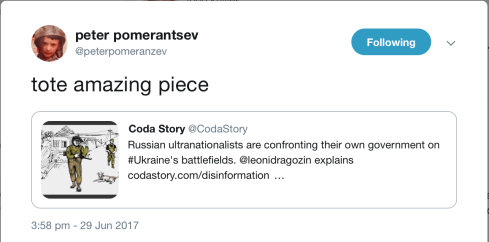 In eastern Ukraine, a small band of Russian ultra-nationalists have joined the battle against the Russian-backed rebels. Reporter Leonid Ragozin explores their motives and background, exposing the ironies of a conflict that has largely been reported in binary terms as a showdown between Russia and the West. This long-form story highlights the risk of blowback from both sides’ reliance on ultra-nationalists as shock troops. It provides a nuanced corrective to the daily news, inviting a fresh assessment of Russian and Western objectives in Ukraine, as well as the narratives that accompany those objectives. My edit for Coda Story.
In eastern Ukraine, a small band of Russian ultra-nationalists have joined the battle against the Russian-backed rebels. Reporter Leonid Ragozin explores their motives and background, exposing the ironies of a conflict that has largely been reported in binary terms as a showdown between Russia and the West. This long-form story highlights the risk of blowback from both sides’ reliance on ultra-nationalists as shock troops. It provides a nuanced corrective to the daily news, inviting a fresh assessment of Russian and Western objectives in Ukraine, as well as the narratives that accompany those objectives. My edit for Coda Story.



